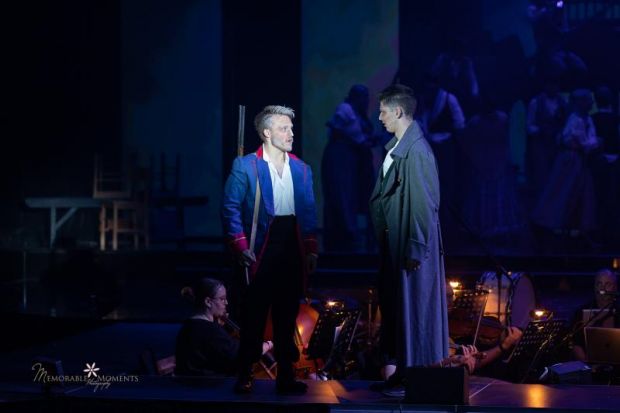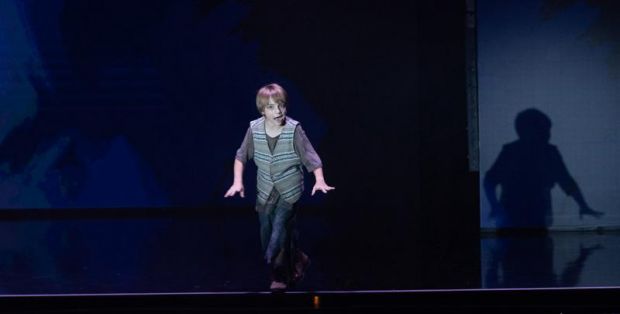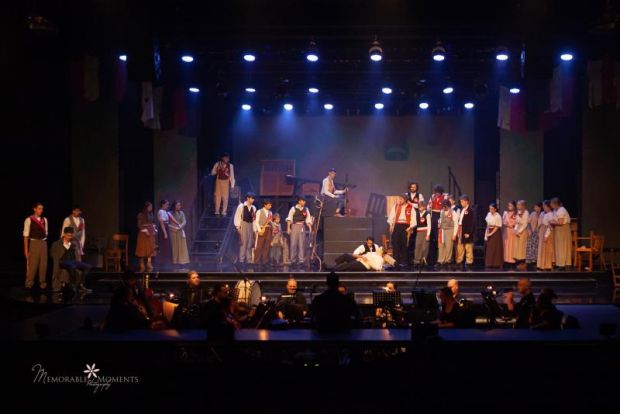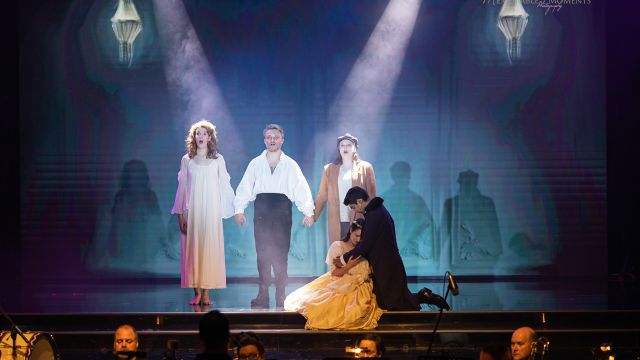Les Misérables
Les Misérables is one of the iconic musicals of our times. Premiering in English in 1985, it has been presented to great acclaim all over the world and is a benchmark for amateur and professional musical theatre companies alike.
Les Misérables takes place in France in the early 19th century and tells the story of Jean Valjean who has been hunted for many years by a merciless police officer, Javert. After breaking his parole, Valjean agrees to care for a factory worker’s daughter. The story comes to a touching resolution against the tumultuous background of the June Rebellion of 1832.
It has something for everyone - history, comedy, romance, tragedy and of course, memorable music and is a brave choice for any company.

Adelaide Youth Theatre is well known for giving young people a ‘chance to shine’ in quality productions and this show is no exception.
Much of the credit for the visual side of the production must go to Ray Cullen, who stepped into the role of director at very late notice. His vision stripped the production back to its essentials - storytelling, emotion and of course, the music.
While the costuming remains true to the original productions, the sets are pared back to projections and set pieces. Even though I am very familiar with the many scenes for the show, I found myself looking at the programme a few times to check where the scene was set. Having said that, the setting we all wait for, the barricade, though not being able to rotate, still provides the dramatic tension and some of the more heart-rending moments of the show.
Cullen’s direction is a clever mix of music-theatre staging and some elements from modern drama. His use of space and the thrust area of the stage bought the action ‘up close and personal’.
It goes without saying that Les Misérables would be nothing without the music and Mark Stefanoff proves his ability to work with young developing voices. The principal work is extremely strong and the chorus work well drilled. The big full cast numbers have the full, rich sound we expect from this show, especially ‘One Day More’ at the end of Act 1.

Mark DeLaine’s orchestra (with Mark Stefanoff on piano 1) was extremely tight although the percussion was a little dominant at times (this could be a sound balance issue).
Connor Olsson-Jones’ Jean Valjean is onstage for most of the production. His character really “hit his straps” in Act 2, particularly ‘Bring Him Home’. Valjean is humanity personified and Jones nails that. His Epilogue is poignant.
Matt Monti’s Javert is compelling to watch. It is rare to find such a young performer so comfortable with stillness. His rendition of ‘Stars’ and his suicide are among the best I have seen from any performer!
Tiffany Gaze’s Fantine is fragile, a mother willing to do anything to protect her child. Her ‘I Dreamed a Dream’ was memorable.
EJ Downing’s Eponine is a well-drawn character with a big voice. ‘On My Own’ and her death on the barricade are highlights.
Aj Patel’s Marius, the young idealistic student, is played with honesty and a crystal-clear voice in all registers, particularly with Eponine in ‘A Little Fall of Rain’.
Sophie Davies’ Cosette is perfectly matched to Marius. Her Act 2 duet ‘Every Day’ with Marius highlighted her well-controlled soprano voice.
Jack Raft adds earnestness and a piercing stare to the young student Enjolras. ‘Do You Hear the People Sing?’ is always a crowd pleaser and Raft’s rendition was no exception.

Liam Tomlin and Diana Baddams’ Monsieur and Madame Thenardier are the comedy relief in Les Misérables, but they are so much more. Tomlin’s ‘Dog Eat Dog’ is a comment on life.
Harrison Thomas’ Gavroche is bigger than all outdoors and nails every facet of the character. His “Little People’ is a delight.
Ayla Kennedy and Maggie Bridges complete the principal cast as Young Cosette and Young Eponine respectively.
The chorus provides a solid backing to the principals, their numbers ‘At the End of the Day’, ‘Lovely Ladies’ and the ‘The Final Battle’ being high points of the production.
My only slight reservations with an otherwise commendable production were some uneven miking and sound balance in Act 1 and needing some extra follow spots in the big numbers. Due to the sheer numbers on stage, I found it difficult to find the performer at times.
Les Misérables by AYT was a hit with the audience on opening night with quite a number of standing ovations and faithfully presented the show’s overarching message – “To love another person is to see the face of God”.
Barry Hill
Subscribe to our E-Newsletter, buy our latest print edition or find a Performing Arts book at Book Nook.

